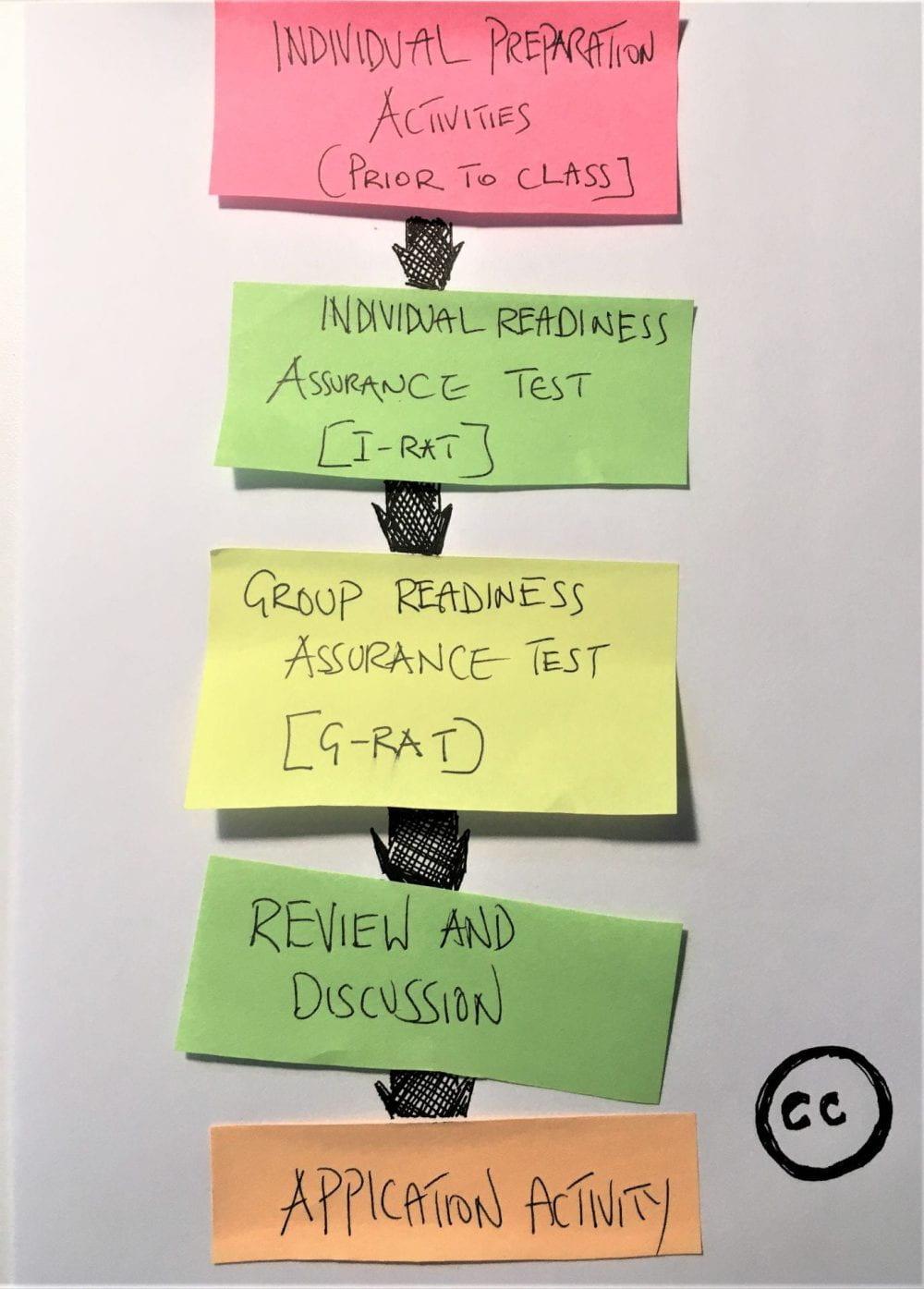Team-based learning is not new and has a long history particularly in America. Larry Michaelson, a Professor of Business Management, who helped to establish the TBL approach in the 1970’s, explains:
The primary learning objective in TBL is to go beyond simply covering content and focus on ensuring that students have the opportunity to practice using course concepts to solve problems. Thus, TBL is designed to provide students with both conceptual and procedural knowledge. – Larry Michaelsen (2008)
The approach is based on 4 principles:
- Groups should be properly formed (e.g. Intellectual talent should be equally distributed among the groups). These teams are fixed for the whole course.
- Students are accountable for their pre-learning and for working in teams.
- Team assignments must promote both learning and team development
- Students must receive frequent and immediate feedback. (1)
TBL Stages
TBL relies on a flipped learning approach so students prepare with videos, podcasts or literature. Then, in the actual session, there is the Readiness Assurance test (I-RAT) where students are asked to complete a multiple-choice test individually to assess understanding of content. In the next stage, the same test is repeated in small teams. This is the G-RAT stage. If it is a face to face session students have a scratch card (specially ordered from Epstein education) However, you can also do TBL online and there is a commercial platform called InteDashboard.
InteDashboard offer a free monthly webinar where you can try TBL out. This is quite useful to experience the TBL approach if you have never done it before and there are some great discussions with academics and practitioners from across the world. You can, of course, develop your own online TBL approach using the Moodle platform.
The team aspect is very important. Team formation has to be done in a transparent way and not just letting students drift into ‘friendship’ groups;which maybe is not such an issue online. The next stage is one that tends not to get used much and that is the appeal stage. Teams have the right to challenge the marks they get and argue their case. Apparently, this is the stage which I heard anecdotally is particularly popular in Law schools but not in other disciplines. However, generally when students discover the potential of this stage it can start happening more frequently, particularly for challenging summative results.
Once the RAP has been done the following stage is the application stage– this builds on prior learning as teams work out solutions to complex problems through a series of exercises. This stage, according to a report (2) by the University of Bradford, is the most challenging aspect of TBL in terms of planning.
Finally, the last stage is peer evolution review. This is where a lot of work is needed in getting students to appreciate the value of this exercise. When it does work students realise that they are not only accountable to themselves but also to their peers. I heard a Medicine teaching academic describing his medical students as being particularly critical of each other which made him decide that there was a need to deliver some training on how to give constructive peer feedback; a very important work skill.
In fact one of the arguments that support the TBL process is the idea that it can help focus on the employability skills, such as communication, teamwork and problem solving that employers are after:
Employers said communication skills are the number one thing they look for in a potential employee (65 percent). They ranked teamwork second (59 percent), self-motivation third (58 percent) and problem-solving fourth (54 percent). HRDirector Oct 2019
Digital tools
There are lots of different digital tools that can support the TBL teaching approach in a face to face context. For forming teams it is important to have a balance and mix of skills. An online survey tool such as Qualtrix (City’s supported survey platform) or even a simple Moodle quiz. For the Rap and Application tests: student response systems such as Poll Everywhere and Moodle forums offer an option for facilitating collaboration, evidencing and recording the teams’ decision making processes. Finally, for the Peer Evaluation stage: this can involve a lot of coordination and organisation to get right; from providing evaluation forms, returning feedback and collating responses. Teammates is a free tool which is specifically designed to manage this. However, it is currently not supported by City so again a Moodle tool like workshop could work here.
TBL is certainly not an easy option as it involves a lot of preparation. Initially, the workload increases though once you have done the planning it apparently gets easier and the technology can really help. Overall though, proponents of TBL strongly feel that student engagement, as well as outcomes, are generally very positive and so worth doing.
(2) University of Bradford report


Thanks Elisabetta. You might be interested to read about the work that Moira Sarsfield from Imperial College London has been doing in the area of team based learning. She presented on the use of Blackboard for TBL – https://www.slideshare.net/BlackboardInternational/moira-sarsfield-kateippolitoimperialcollegelondon.
Thanks Julie – useful as a real example of using an inhouse VLE as I suggested in the post
Very useful post Elisabetta, I like the ref. to the employability skills you mention, nice tie in with my blog post due in a couple of days!